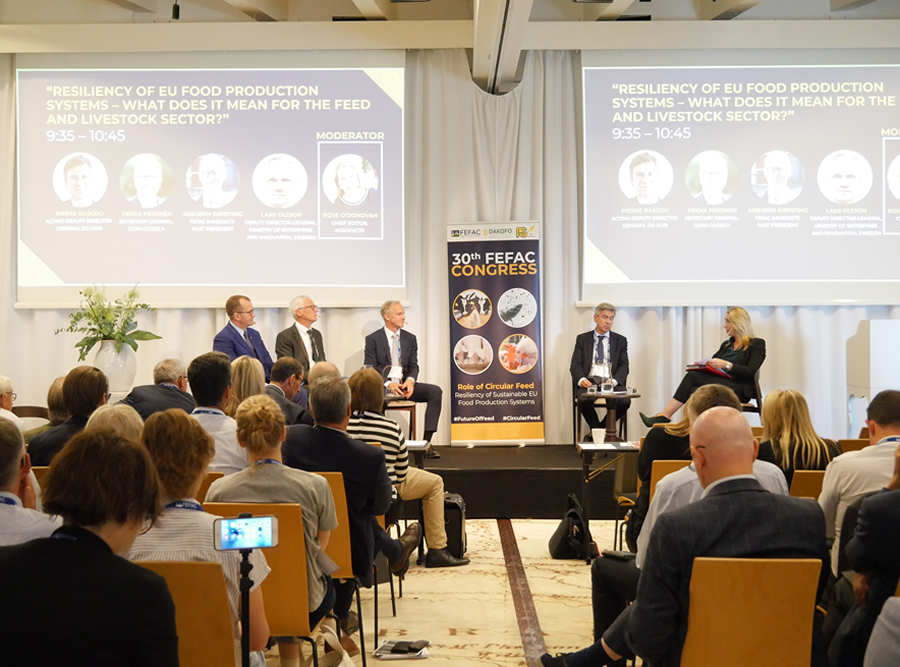June 20, 2023
FEFAC 30th Congress focuses on resilience of EU food production systems, role of circular feed

FEFAC, DAKOFO, and FS, which represents the European, Danish and Swedish feed industries, respectively, organised the 30th FEFAC Congress on June 14-16 in Ystad, Sweden.
The theme of the event was "Resilience of Sustainable EU food production systems – Role of circular feed".
A public conference on June 15 welcomed various national, European and international speakers and was attended by over 200 participants. Two high-level sessions analysed key policy and market drivers for circular feed solutions, followed by three expert workshops focusing on key sustainability pressure points for different animal species.
In a keynote opening, Pierre Bascou, DG AGRI's acting deputy director general, expressed his appreciation to FEFAC and supply chain partners for ensuring functional food supply chains in times of crises. He shared a positive short-term market outlook for the livestock and feed industry, with more cost-efficient feed cereal grains becoming available, despite ongoing severe droughts in parts of Southern Europe.
Bascou pointed to a range of EU policy drivers and measures that aim to accelerate the pace of transition towards better environmental and climatic performance of the livestock sector via CAP National Strategic Plans. He also confirmed the release of the updated EU Protein Plan at the beginning of 2024, which, this time, will be broader in scope, covering the different protein sources for feed and food use, while also addressing the circularity role of livestock production in food production systems.
Copa-Cogeca secretary-general, Pekka Pesonen, expressed his concerns about EU Green Deal policy objectives aiming at reducing or pushing out the European livestock sector, which will undermine EU food security and autonomy goals and the rural economy.
Dirk Jacobs, FoodDrinkEurope's director general, called on the upcoming European Commission to allocate funds for a sustainable food investment plan in the next EU legislature's budget, which also reflects the feed industry's potential to prevent nutrient losses in the food chain. Former FEFAC president Asbjørn Børsting called on an EU regulatory framework that supports the development and uptake of innovation that boost sustainability, such as new genomic techniques and the legal possibility to harvest cover crops for bio-refining purposes.
Hanne Søndergaard (ARLA) and Marc Sneyders (Bayer) presented their company-specific sustainability initiatives on dairy production and more sustainable agronomic approaches, respectively, to allow for the reduction of scope 3 greenhouse gas emissions. They stressed the importance of a valid economic incentives model for farmers to be able to implement the solutions research and innovation are able to offer.
The congress featured three workshops dedicated to analysing the highly varying sustainability pressure points across different farm animal species; farmed fish, ruminants and poultry and pigs. The workshops showcased practical circular solutions and facilitated a discussion with value chain partners and national authorities on further adaptations to the EU regulatory framework to enable the safe use of nutrients from side streams in the agri-food and fisheries sector to boost the circular economy potential of the livestock and aquaculture industry.
Newly elected FEFAC president Pedro Cordero closed the 30th FEFAC Congress, stating: "The Congress allowed to put the spotlight on current sustainability challenges and opportunities that the feed and livestock sectors are facing. We know that we still have a lot to learn and do, but we will continue to deliver practical and viable tools jointly with our chain partners which will allow the EU livestock and aquaculture sector to stay on track to achieve most of the relevant EU Green Deal Goals".
FS president Jan Rundqvist said at the first Nordic & Baltic Feed Millers event that "the 30th FEFAC Congress clearly showed our willingness and proactivity as the feed sector to stay ahead of the curve, developing innovative feeding solutions that can help our farmers remain competitive while addressing legitimate societal demands, as expressed in the EU Green Deal".
- FEFAC










